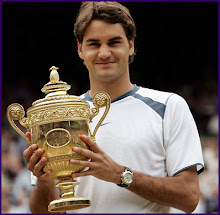By John F. Murray, Ph.D
 Wouldn't it be grand if there were a special world where every player won every match? In this tennis fantasyland, scores would be meaningless since every player would be crowned champion. If this is what you seek, hit the snooze button one more time. When you wake up and smell the Starbucks again, you'll remember that every player eventually loses except the tournament winner. In fact, without the risk of losing, your dream would be so boring it would keep you asleep! The challenge and uncertainty in tennis provides much of the thrill and an obsession with winning only hastens defeat.
Wouldn't it be grand if there were a special world where every player won every match? In this tennis fantasyland, scores would be meaningless since every player would be crowned champion. If this is what you seek, hit the snooze button one more time. When you wake up and smell the Starbucks again, you'll remember that every player eventually loses except the tournament winner. In fact, without the risk of losing, your dream would be so boring it would keep you asleep! The challenge and uncertainty in tennis provides much of the thrill and an obsession with winning only hastens defeat.
Too much emphasis is wrongly placed on winning. This does not mean not wanting to win far from it. That is why we play sports. But remember that there is also an opponent and that the most control we really ever have in a match over outcome is 50%. 50% is just as good as zero since there is never more than half control.
When NY Yankees owner George Steinbrenner gave Joe Torre the ultimatum, “win against Cleveland or you are out,” media scurried to cover the “bad boss” element. I made the point that saying “win or you are fired” is the same as saying “flap your arms and fly or you are fired!” Nobody can control winning, but everybody can control performance, and that is where the focus needs to remain.
Task-involved athletes focus on performance and display high intrinsic motivation, produce maximal effort, and persist longer across a variety of situations. Players emphasizing performance goals (e.g., higher percentage of first serves) over outcome goals (e. g., winning) retain more attention for the immediate task at hand. Getting wrapped up in thoughts about outcome only leads to distraction, anxiety, and pressure.
What you really want is to be sincerely fascinated with the many dimensions of performance. Staying excited about performance keeps you firmly in the present and guards against the loss of self-confidence that could occur when the next Rafael Nadal or Justine Henin rolls into your upcoming tournament.
Take a few seconds to recall the best performance of your life. You may not remember the details well because you were so completely absorbed in the moment. Expending energy dwelling on past mistakes or possible outcomes would have only spoiled this peak experience. Your focus on performance that day was admirable and winning took care of itself. This is where you want to be every match.
One way to remain focused on performance is to set short-term goals. These should include daily, weekly, and monthly goals. Start by investing in a small notebook or computer blog site which should be used to keep track of goals, achievements and comments. A rule of thumb is to set goals that you can achieve about 55% of the time. If you are reaching your goals more than 65% of the time set greater challenges. If you achieve your goals less than 45% of the time set them easier.
Make sure that your performance goals are specific, challenging, and realistic. Here are some examples of viable performance goals in tennis:
1. Increase your net approaches by 10 each set.
2. Increase your first service percentage from 55% to 70%.
3. Replace every on-court negative self-statement with a positive comment.
4. Lob the ball at least 50% of the time when in serious trouble.
5. Reduce your unforced errors by 5 per set.
Remember to set mental as well as physical performance goals. Self-knowledge is the key to setting intelligent goals. As you notice improvements in performance, don't be surprised if your opponents begin losing a little more often.
So stop flapping your arms to fly. Your best chance of flying is to focus first on performing.


